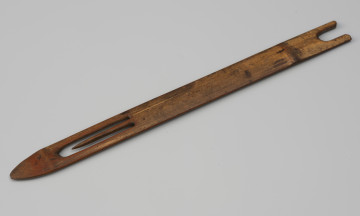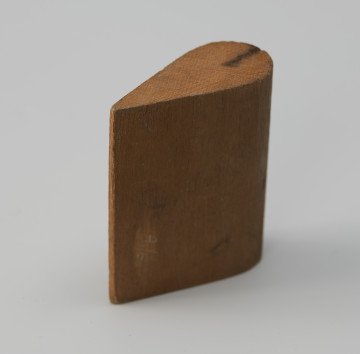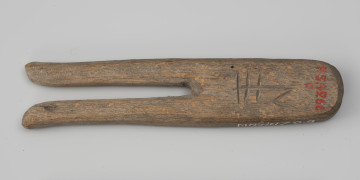
Fish net needle
1900 — 1950
National Museum in Szczecin
Part of the collection: European classics of modernity
After obtaining a diploma in architecture at the Technical University of Lviv, Władysław Jarocki began to study painting under Józef Mehoffer and Leon Wyczółkowski at the Academy of Fine Arts in Kraków (1902-1906). His acquaintance with Fryderyk Pautsch and Kazimierz Sichulski, who also came from the South-Eastern Borderlands, linked the work of all three of them, in the eyes of the critics, with his interest in folklore. Their joint stay in Tatarowo nad Prutem (1904) proved to be a breakthrough. The folk types created then consolidated the image of the Pokucie singers and the informal nickname of their friends - Hutsuls. For Jarocki it was a continuation of his earlier ethnographic passions, nurtured incidentally during his engineering studies, when he made sketches of journeys to Kharkiv and Kursk Governorates, to Crimea and Caucasus. After a two-year study at the Académie Julian in Paris (1906-1907), these motifs were joined by new reminiscences from Podhale. In all cases, the peasants painted by Jarocki, fixed in portrait studies and in genre scenes at work and celebrations, were frozen in hieratic poses and monumental form. The artist was captivated by the colourfulness of the costumes, attributes and rituals, which allowed him to create decorative, but static arrangements in the spirit of Art Nouveau with a clear, flexible contour and a flat patch of colour in a thickened ornament contrasted with the model-like parts of the complexion. The rise of the Second Polish Republic drew attention to another ethnic group - the Kashubians. From 1921, Jarocki, employed at the Academy in Kraków, started summer trips to the Puck Bay. These resulted in drawings, prints, watercolours and, to a lesser extent, oil paintings of Rozewie and Hel. The latter group includes a composition with fishermen, known from the Szczecin version and from the Kraków version, which came three years later. A large figure of a man portrayed with his back to the foreground of the square canvas introduces the viewer to the aura of the beach, where wooden poles with drying nets were placed. Through the brown clothes of the figure and the dark decorative twisted lines of the plait there shine bright fields of ochre sand, emerald sea and grey-blue sky.
Szymon Piotr Kubiak
Author / creator
Dimensions
cały obiekt: height: 140 cm, width: 139 cm
Object type
painting
Creation time / dating
Creation / finding place
Identification number
Location / status

1900 — 1950
National Museum in Szczecin

1900 — 1950
National Museum in Szczecin

1890 — 1950
National Museum in Szczecin
DISCOVER this TOPIC
Castle Museum in Łańcut
DISCOVER this PATH
Educational path